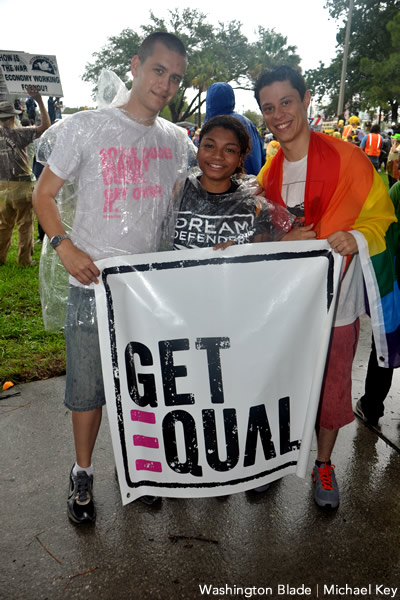National
RNC 2012: LGBT protesters demonstrate at convention
Undeterred by rain, activists rail against Republican Party


Juan Rodriguez (left), Nelina Stamp (center) and Felipe Sousa-Rodriguez at an anti-GOP rally (Blade photo by Michael Key)
TAMPA, Fla. — A major demonstration on the first day of the Republican National Convention included a handful of LGBT protesters who decried the GOP for supporting anti-gay policies.
On Monday, nearly 500 demonstrators gathered in Tampa’s Perry Harvey, Sr., Park for the “March on the RNC” — braving inclement weather — to speak out against the “agenda of the one percent” before marching for about a mile to the city’s convention center. Activists affiliated with GetEQUAL were among those in the LGBT part of the coalition.
Jarrod Scarbrough, a gay Tampa, Fla., resident and co-state leader of GetEQUAL Florida, was among those addressing the audience, saying the policies adopted by the Republican Party as part of the draft version of its platform would harm both him and his partner of 18 years as well as his daughter.
“We are a family, but this week, the Republicans will try to add language to their platform to continue to discriminate against families like mine,” Scarbrough said. “They also want to give an unborn fetus full rights, yet if that fetus grows up to be LGBTQ, 88 percent of those rights will be ripped away. That’s right, as a gay man, I have 12 percent of the rights as heterosexuals. This is wrong, especially when the Fourteenth Amendment to the Constitution affirms that all men are created equal.”
Scarbrough was among the activists at the White House Easter Egg Roll who intended to ask President Obama to issue an executive order prohibiting federal contractors from discriminating against LGBT workers. The White House later said Obama wouldn’t issue the order at this time, but the action did lead to mainstream media asking White House Press Secretary Jay Carney about the possible directive at the daily news briefing on the same day.
Felipe Sousa-Rodriguez, national field director for GetEQUAL, was alongside Scarbrough onstage — donning a rainbow Pride flag as if it were a poncho — and translated his fellow activist’s remarks into Spanish.
Sousa-Rodriguez, who’s also done work as a DREAM activist, later the told the Washington Blade he wanted to serve as translator to “make sure that everybody could understand the march.”
“Basically what we’re doing is telling that the Republican Party is actually advocating for more rights for a fetus than for an LGBT person — an American person who pays taxes, who fully contributes to their community,” Sousa-Rodriguez said. “They don’t want to extend the Fourteenth Amendment rights to people like us, and yet give it fetuses before they were born. Basically, what they are saying is they want to give more before we are than after we are born.”
The rainy weather impacted the number of people who attended the march. According to Sousa-Rodriguez, about 5,000 demonstrators were expected as well as about a dozen LGBT people, but buses that were scheduled to deliver protesters to the rally were cancelled because of Hurricane Isaac and only a fraction of that number appeared.
A number of activists who attended the march held signs criticizing the policies of the Republican Party and its presumptive presidential nominee Mitt Romney. One held up a sign saying, “Abort Shit Romney & his Taliban Party,” while another sign read, “MIsTrusT,” with letters making up Romney’s first name in capital letters.
But protests were directed at the Democrats as well as Republicans. Others on stage denounced policies keeping the United States at war in Afghanistan and harming undocumented immigrants in the United States. Protesters affiliated with the socialist Workers World Party held up a sign reading “RNC/DNC = Tool of the 1%: Fight Capitalist Rule.”
Green Party Vice Presidential Nominee Cheri Honkala, a single mother who was once homeless along with her nine-year-old son, was among those who spoke and called on participants to “occupy” the polls in November and call for more voices in the upcoming two-party presidential debates.
“If they don’t let other viewpoints into the debate, we’ve got to occupy the debate,” Honkala said. “Don’t vote for the lesser of two evils: vote courage.”
After the march concluded, Scarbrough said demonstrators experienced no hostility from Republicans or others opposed to the protesters’ views and the police arrested no one affiliated with the march. According to ABC News, police did arrest one protester, 20-year-old Dominick Delarosa, when he refused to remove a mask at the request of police.
Nelina Stamp, a 24-year-old queer activist who recently moved to Miami, said she wanted to participate in the march as a visible LGBT person because of LGBT members of her family who live in her home state of New York.
“My mother is a lesbian, and for so long, I had to see her not be able to get married, not have the same equality, be able to get fired from her workplace and live in these circumstances that are just not fair, right?” Stamp said. “Thankfully, New York passed marriage equality just last year, which is great, but still on the federal level, the LGBT community doesn’t have that many rights, and I’m here because it’s not on the Republicans’ agenda.”
Stamp is also a leader with the group Dream Defenders, which seeks to advance the DREAM Act and issues related to undocumented immigrants as well as mass incarceration in the prison pipeline.
New York
N.Y. lawmaker vows ‘Pride flag will fly again’ at Stonewall Monument
After a Jan. 21 policy shift, Pride flags were banned at national parks, prompting backlash from Bottcher and LGBTQ advocates.

Hours after news broke that the National Park Service would no longer allow Pride flags to fly at the Stonewall National Monument — the birthplace of the modern LGBTQ rights movement in the United States — the Washington Blade spoke with New York State Sen. Erik Bottcher, who represents the area surrounding the Stonewall Inn and the national monument.
During the interview, Bottcher, who is gay, spoke about the policy change and outlined steps he plans to take in the coming days to push for its reversal.
“This is another act of erasure,” Bottcher told the Blade. “It’s a cowardly attempt to rewrite history and to intimidate our community. This is Stonewall — it’s where we fought back, where we ignited a global movement for equality — and we refuse to go back. We’re not going to accept these acts of erasure.”
The Stonewall Inn became a flashpoint in 1969 after NYPD officers raided the bar, part of a longstanding pattern of police harassment of LGBTQ spaces. The raid sparked days of protest and resistance along Christopher Street, now widely recognized as the catalyst for the modern LGBTQ rights movement.
While the events are often referred to as the “Stonewall Riots,” many activists and historians prefer the term “Stonewall Uprising,” emphasizing that the resistance was a response to systemic oppression rather than senseless violence. LGBTQ patrons and community members fought back — shouting “Gay Power!” and “Liberate Christopher Street!” — as crowds grew and frustration with police abuse boiled over.
Since the uprising, LGBTQ people and allies have gathered annually in June to commemorate Stonewall and to celebrate Pride, honoring the movement that placed LGBTQ voices at the center of the fight for equality.
In June 2016, then President Barack Obama officially designated the space as the Stonewall National Monument, making it the United States’s first national monument designated for an LGBTQ historic site.
Now, nearly 10 years later, President Trump’s appointed NPS acting director Jessica Bowron changed policy on Jan. 21 regarding which flags are allowed to be flown in national parks. Many, including Bottcher, say this is part of a larger targeted and deliberate attempt by the administration to erase LGBTQ history.
“It’s clear they’re making a conscious decision to erase the symbols of our community from a monument to our community’s struggle,” he said. “This is a calculated and premeditated decision, and it could be — and should be — reversed.”
“Let’s be clear,” Bottcher added, “they wish we didn’t exist … But we’re not going anywhere. We refuse to go back into the shadows.”
When asked why it is critical to challenge the policy, Bottcher emphasized the importance of visibility in preserving LGBTQ history.
“This is why it’s so important that we not let this stand,” he said. “Visibility is critical. When people see us, learn about us, and get to know us, that’s how we break down prejudice and stereotypes. We cannot allow them to push us back into the shadows.”
Other LGBTQ leaders and elected officials were quick to condemn the removal of the Pride flag, which had flown since the site’s official designation as a national monument.
New York City Mayor Zohran Mamdani called the decision “outrageous.”
“I am outraged by the removal of the Rainbow Pride Flag from Stonewall National Monument,” Mamdani said in a statement. “New York is the birthplace of the modern LGBTQ+ rights movement, and no act of erasure will ever change or silence that history.”
“Our city has a duty not just to honor this legacy, but to live up to it,” he added. “I will always fight for a New York City that invests in our LGBTQ+ community, defends their dignity, and protects every one of our neighbors — without exception.”
Senate Minority Leader Chuck Schumer also condemned the move.
“The removal of the Pride Rainbow Flag from the Stonewall National Monument is a deeply outrageous action that must be reversed immediately,” Schumer said in a statement to The Advocate. “Stonewall is a landmark because it is the birthplace of the modern LGBTQ rights movement, and symbols of that legacy belong there by both history and principle.”
Cathy Renna, communications director for the National LGBTQ Task Force, said the flag’s removal will not erase the movement it represents.
“They can take down a flag, but they can’t take down our history,” Renna said. “Stonewall is sacred ground rooted in resistance, liberation, and the legacy of trans and queer trailblazers who changed the course of history.”
Human Rights Campaign National Press Secretary Brandon Wolf echoed that sentiment.
“Bad news for the Trump administration: these colors don’t run,” Wolf said. “The Stonewall Inn and Visitors Center are privately owned, their flags are still flying high, and that community is just as queer today as it was yesterday.”
Tyler Hack, executive director of the Christopher Street Project, said the removal was aimed squarely at LGBTQ visibility.
“The Pride flag was removed from Stonewall for one reason: to further erase queer and trans people from public life,” Hack said. “Stonewall marks the moment when queer and trans people fought back and demanded dignity. Our history is not theirs to erase.”
Bottcher closed with a promise to his constituents — and to the broader LGBTQ community — that the Pride flag’s removal would not be permanent.
“We will not be erased. We will not be silenced,” he said. “And the Pride flag will fly again at the birthplace of our movement.”
Florida
Disney’s Gay Days ‘has not been canceled’ despite political challenges
GayDays is moving forward with its planned LGBTQ meet-up

Gay Days in Orlando is preparing for its 2026 gathering though organizers have yet to release full details.
Concerns emerged about the status of the annual meetup of LGBTQ people at Walt Disney World in Orlando, Fla., after social media posts and multiple news outlets reported the event would not take place this year.
In response to inquiries from the Blade, Josh Duke, co-owner of Gay Days, clarified that an update would come this week.
“At this time, I’d like to clarify that Gay Days Orlando has not been canceled,” an email to the Blade said. “We are currently finalizing details regarding our plans for 2026 and will be making an official announcement later this week.”
Earlier this week, Gay Days posted about a pause in their plans for the annual meeting, which quickly gained traction online.
In an official statement on social media, Gay Days organizers cited several factors behind what had initially appeared to be a cancellation of their 2026 event.
“Changes to our host hotel agreement, the loss of key sponsorship support, and broader challenges currently impacting LGBTQIA+ events nationwide made it impossible to deliver the experience our community deserves,” organizers wrote. However, the statement added, “This is a pause — not an ending.”
In a longer message shared with supporters, organizers elaborated on that now-reversed decision.
“Gay Days Family — it is with very heavy hearts that we share Gay Days 2026 will not take place this year. This was an incredibly difficult decision and one that was only made after every possible option was explored.
“Gay Days has always been more than an event — it is community, family, and a place where so many memories are made. While this pause is painful, it also gives us the opportunity to step back, listen, and begin shaping a stronger and reimagined GayDays for the future. Thank you for your continued love, patience, and support. This is not goodbye — it’s a reset, and we look forward to creating the future of GayDays together.”
GayDays, which began in 1991, encourages queer Disney fans to visit the Orlando theme park while wearing red shirts to identify one another. Originally focused on gay men reclaiming the childhood joy often denied due to homophobia, the event has expanded over the years to include LGBTQ+ families on summer vacations and queer couples honeymooning in the Magic Kingdom.
Disney made history in 2019 by holding its first-ever official Pride event at its European park, Disneyland Paris. In 2023, Disneyland California hosted the first U.S. official Pride event.
Concerns about the potential cancellation had arisen amid broader challenges affecting LGBTQ events nationwide. These include changes in hotel agreements, sponsorship support, and Florida’s increasingly restrictive anti-LGBTQ policies under Gov. Ron DeSantis. Florida currently has an equality score of -3.00 out of 49 from the Movement Advancement Project, which evaluates states based on policies affecting relationship and parental recognition, nondiscrimination, religious exemptions, LGBTQ youth, healthcare, criminal justice, and transgender identity documentation.
Recent legislation in Florida has included prohibitions on hormone replacement therapy for transgender minors, restrictions on adult access to treatment, bans on drag performances for those under 18, bathroom bans for transgender people in state buildings, and expansion of the Parental Rights in Education Act, commonly called the “Don’t Say Gay” law. These measures limit public school instruction or discussion about sexual orientation and gender identity.
Gay Days Anaheim is scheduled to take place at Disneyland Resort in September.
Disney has also maintained a focus on Pride, reporting in 2022 that proceeds from Pride merchandise benefited numerous LGBTQ organizations, including GLSEN, PFLAG, The Trevor Project, Zebra Coalition, the Los Angeles LGBT Center, the LGBT Center Orange County, the San Francisco LGBT Center, and the Ali Forney Center. Pride merchandise sold internationally supports local LGBTQ organizations in those regions.
More details about this event are expected to be released on Friday.
New York
Pride flag removed from Stonewall Monument as Trump targets LGBTQ landmarks
The new NPS policy targets Pride flags amid consistent efforts from the Trump administration to minimize LGBTQ history.

A rainbow Pride flag flying at the Stonewall National Monument in New York was removed at the direction of Trump administration officials at the National Park Service, according to a source familiar with the matter who spoke to the Blade on condition of anonymity.
The source said the move had been in the works for weeks and is part of ongoing efforts by the Trump-Vance administration to erase LGBTQ identity from federally controlled landmarks.
In response to the Blade’s request for information about the new flag policy, the National Park Service provided the following statement:
“Current Department of the Interior policy provides that the National Park Service may only fly the U.S. flag, Department of the Interior flags, and the Prisoner of War/Missing in Action flag on flagpoles and public display points. The policy allows limited exceptions, permitting non-agency flags when they serve an official purpose. These include historical context or reenactments, current military branch flags, flags of federally recognized tribal nations affiliated with a park, flags at sites co-managed with other federal, state, or municipal partners, flags required for international park designations, and flags displayed under agreements with U.S. Citizenship and Immigration Services for Naturalization ceremonies.”
The statement also included official guidance on the display of non-agency flags issued by Trump-appointed National Park Service Director Jessica Bowron.
The Blade reached out to other organizations to confirm the status of the Pride flag last week, including the Stonewall National Monument Visitor Center, the NYC Landmarks Preservation Commission, and the National Parks Conservation Association. None were able to provide details about whether the flag was still flying at that time but it has since been removed.
This action aligns with other moves targeting and erasing LGBTQ history. In September, the Blade reported that three organizations originally slated to receive more than $1.25 million from the National Park Service’s Underrepresented Communities Grant Program would no longer receive funding: In Washington, D.C., the Preservation League had been awarded $75,000 to document LGBTQ+ historic resources. In Providence, R.I., the Preservation Society was slated for $74,692 to conduct an LGBTQ+ survey and prepare a National Register nomination. And in New York, the Fund for the City of New York, Inc., had been awarded $32,000 to nominate the residence of Bayard Rustin — the iconic civil rights and LGBTQ activist — as a National Historic Landmark.



















